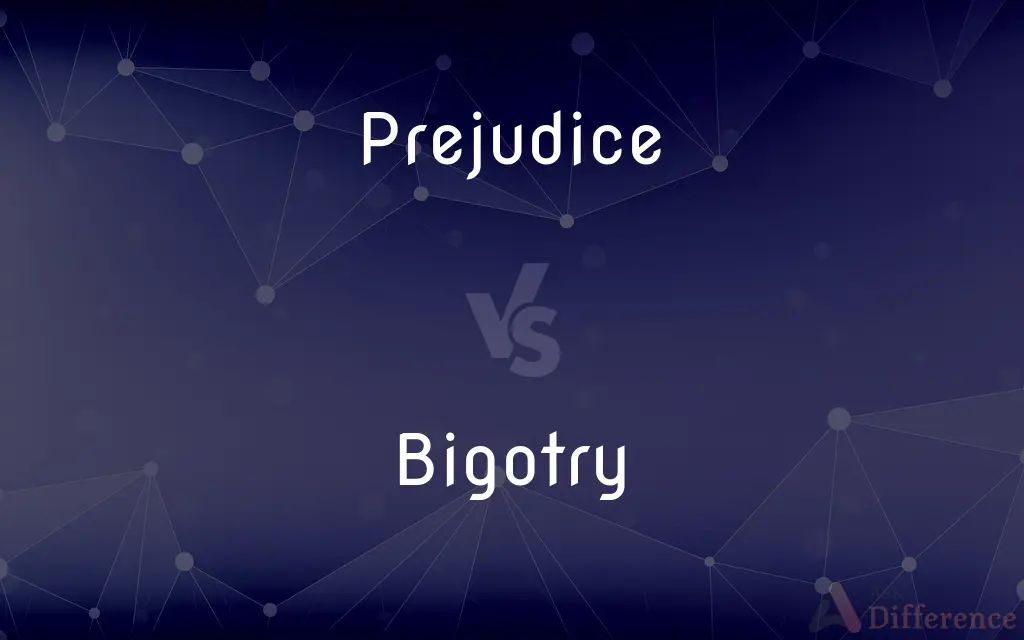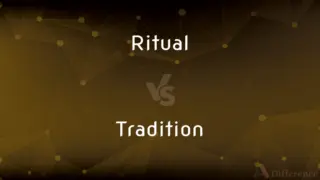Prejudice vs. Bigotry — What's the Difference?
By Tayyaba Rehman — Updated on September 16, 2023
Prejudice is a preconceived opinion or bias, often based on limited information, that can be either positive or negative. Bigotry, on the other hand, is an intense, irrational hatred or intolerance towards people based on characteristics.

Difference Between Prejudice and Bigotry
Table of Contents
ADVERTISEMENT
Key Differences
Prejudice involves having preconceived opinions or judgments about individuals or groups, often without adequate reason. Bigotry takes prejudice a step further; it includes a strong, often irrational, aversion or hatred towards certain groups based on their characteristics.
Prejudice can be either positive or negative and may not always result in harmful behavior. In contrast, bigotry usually manifests as negative attitudes and leads to discriminatory or hateful actions against the targeted group.
From a grammatical standpoint, both "prejudice" and "bigotry" function as nouns, and both can be modified by adjectives like "racial," "religious," or "sexual." However, "prejudice" can also function as a verb, meaning to pre-judge, whereas "bigotry" remains a noun.
Prejudice might be seen as a mental shortcut, a way to process information quickly based on limited evidence. Bigotry, however, represents a refusal to reassess one's prejudices, even when confronted with new information, thus making it a more extreme form of prejudice.
In summary, prejudice is a broader term that describes a bias or preconceived notion, while bigotry is a more extreme form of prejudice that includes intense, often irrational, hatred or intolerance towards a specific group.
ADVERTISEMENT
Comparison Chart
Intensity
Less intense
More intense
Manifestation
Positive or Negative
Usually Negative
Grammatical Usage
Noun, can be a verb
Noun only
Impact
May not result in harmful acts
Often results in discriminatory behavior
Flexibility
Can be reconsidered
More rigid, less open to change
Compare with Definitions
Prejudice
Prejudgment or bias based on limited information.
Her prejudice against spiders was based on an incident from childhood.
Bigotry
Manifests in harmful actions or discrimination.
The bigotry displayed led to a hate crime.
Prejudice
A cognitive shortcut that simplifies complex realities.
Her prejudice led her to make hasty judgments.
Bigotry
Strong, often irrational hatred or intolerance toward specific groups.
His bigotry against other religions was evident.
Prejudice
Can be towards individuals or groups.
She had a prejudice against people from certain regions.
Bigotry
A more extreme form of prejudice.
His views crossed the line from prejudice to bigotry.
Prejudice
Prejudice can be an affective feeling towards a person based on their perceived group membership. The word is often used to refer to a preconceived (usually unfavourable) evaluation or classification of another person based on that person's perceived political affiliation, sex, gender, beliefs, values, social class, age, disability, religion, sexuality, race, ethnicity, language, nationality, complexion, beauty, height, occupation, wealth, education, criminality, sport-team affiliation, music tastes or other personal characteristics.The word "prejudice" can also refer to unfounded or pigeonholed beliefs and it may apply to "any unreasonable attitude that is unusually resistant to rational influence".
Bigotry
Less likely to be swayed by rational argument.
His bigotry remained steadfast, despite evidence to the contrary.
Prejudice
The act or state of holding unreasonable preconceived judgments or convictions
“This is not actually a volume of the best short stories … These are just the stories that I like best, and I am full of prejudice and strong opinions” (Ann Patchett).
Bigotry
The attitude, state of mind, or behavior characteristic of a bigot; intolerance.
Prejudice
An adverse judgment or opinion formed unfairly or without knowledge of the facts
A boy with a prejudice against unfamiliar foods.
Bigotry
Characteristic qualities of a bigot: (especially religious, anti-religious or racial) intolerant prejudice, opinionatedness, or fanaticism; fanatic intolerance.
Prejudice
Irrational suspicion or hatred of a particular social group, such as a race or the adherents of a religion.
Bigotry
(dated) Obstinate prejudice or opinionatedness.
Prejudice
Detriment or harm caused to a person, especially in a legal case
The delay operated to her prejudice.
Bigotry
The state of mind of a bigot; obstinate and unreasoning attachment of one's own belief and opinions, with narrow-minded intolerance of beliefs opposed to them.
Prejudice
Preclusionary effect, preventing further pursuit of one's interests
The case was dismissed with prejudice.
Bigotry
The practice or tenets of a bigot.
Prejudice
To fill with prejudice or cause to judge with prejudice
My rural upbringing has prejudiced me against living in the city.
Bigotry
The intolerance and prejudice of a bigot
Prejudice
To affect detrimentally or harmfully by a judgment or act
Negative media coverage prejudiced people's opinion of the mayor.
Bigotry
Typically targets characteristics like race, religion, or sexual orientation.
Her bigotry against LGBTQ+ people was unacceptable.
Prejudice
(countable) An adverse judgment or opinion formed beforehand or without knowledge of the facts.
Prejudice
(countable) A preconception, any preconceived opinion or feeling, whether positive or negative.
Prejudice
(countable) An irrational hostile attitude, fear or hatred towards a particular group, race or religion.
I am free of all prejudices. I hate everyone equally.
Prejudice
(obsolete) Knowledge formed in advance; foresight, presaging.
Prejudice
Mischief; hurt; damage; injury; detriment.
Prejudice
(transitive) To have a negative impact on (someone's position, chances etc.).
Prejudice
(transitive) To cause prejudice in; to bias the mind of.
Prejudice
Foresight.
Naught might hinder his quick prejudize.
Prejudice
An opinion or judgment formed without due examination; prejudgment; a leaning toward one side of a question from other considerations than those belonging to it; an unreasonable predilection for, or objection against, anything; especially, an opinion or leaning adverse to anything, without just grounds, or before sufficient knowledge.
Though often misled by prejudice and passion, he was emphatically an honest man.
Prejudice
A bias on the part of judge, juror, or witness which interferes with fairness of judgment.
Prejudice
Mischief; hurt; damage; injury; detriment.
England and France might, through their amity,Breed him some prejudice.
Prejudice
To cause to have prejudice; to prepossess with opinions formed without due knowledge or examination; to bias the mind of, by hasty and incorrect notions; to give an unreasonable bent to, as to one side or the other of a cause; as, to prejudice a critic or a juryman.
Suffer not any beloved study to prejudice your mind so far as to despise all other learning.
Prejudice
To obstruct or injure by prejudices, or by previous bias of the mind; hence, generally, to hurt; to damage; to injure; to impair; as, to prejudice a good cause.
Seek how may prejudice the foe.
Prejudice
A partiality that prevents objective consideration of an issue or situation
Prejudice
Disadvantage by prejudice
Prejudice
Influence (somebody's) opinion in advance
Prejudice
Can be either positive or negative.
He had a prejudice in favor of locally-made products.
Prejudice
Can manifest in attitudes, beliefs, or actions.
His prejudice was evident in his refusal to hire her.
Common Curiosities
Is prejudice always negative?
No, prejudice can be either positive or negative.
What is bigotry?
Bigotry is an intense, irrational hatred or intolerance towards certain groups.
Is bigotry always negative?
Bigotry is typically negative and results in discriminatory behavior.
Can bigotry be a verb?
No, "bigotry" functions only as a noun.
Is bigotry a stronger form of prejudice?
Yes, bigotry is a more extreme form of prejudice.
Is prejudice based on ignorance?
Often, prejudice is based on limited or incorrect information.
What is prejudice?
Prejudice is a preconceived opinion or bias, often based on limited information.
Can prejudice be reconsidered?
Prejudice can be reconsidered and changed upon receiving new information.
Can prejudice be a verb?
Yes, "prejudice" can function as a verb meaning to pre-judge.
Is bigotry easy to change?
Bigotry is often more rigid and less open to change.
Does bigotry result in discrimination?
Bigotry usually leads to discriminatory or harmful actions.
Is bigotry based on ignorance?
Bigotry often stems from irrational beliefs and is less likely to be swayed by facts.
What's the plural of prejudice?
The plural form is "prejudices."
Can prejudice result in discrimination?
Prejudice can lead to discrimination but it is not always the case.
What's the plural of bigotry?
The plural form is "bigotries."
Share Your Discovery

Previous Comparison
Manger vs. Stable
Next Comparison
Ritual vs. TraditionAuthor Spotlight
Written by
Tayyaba RehmanTayyaba Rehman is a distinguished writer, currently serving as a primary contributor to askdifference.com. As a researcher in semantics and etymology, Tayyaba's passion for the complexity of languages and their distinctions has found a perfect home on the platform. Tayyaba delves into the intricacies of language, distinguishing between commonly confused words and phrases, thereby providing clarity for readers worldwide.















































